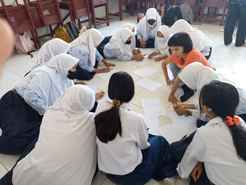
Our work on society has a number of vibrant and diverse strands: from the question of public engagement with issues such as climate change, risk, urban living and neuroscience, to economic and work psychology, to public understanding of mental illness.
Studying 'common-sense' or social understandings of risk and health, science and the environment can help us improve our capacity, as a society, to think about how to prepare ourselves for the future. Examples include an intervention to change earthquake preparedness in highly seismic regions; another investigates how we can improve life in our large, and ever-growing, cities.
The economic and work psychology team engages with the dark side of behaviour at work: whistle-blowing and the pressure not to whistle-blow, bullying, theft, and management upheaval.
Our work on social understandings of mental illness aims to guide thinking on how we educate people at large about mental health, with the aim of countering the shame and isolation that can make life even harder for individuals facing mental health problems.
Finally, the study of society group as a whole has an active interest in media psychology, the efficacy of advertising/health campaigns and the impact of the social media.
Resilient School Hubs

PI: Helene Joffe with co-investigators Priti Parikh (The Bartlett School of Sustainable Construction, UCL), Tiziana Rossetto (Civil, Environmental & Geomatic Engineering, UCL),
Carmine Galasso (Civil, Environmental & Geomatic Engineering, UCL), Ella Melianda (University of Syiah Kuala/TDMRC) and Sukiman Nurdin (Tadulako University)
£827,000 UKRI-ESRC
The Resilient School Hubs project is funded by the UKRI-ESRC. It is a collaborative project bringing together UCL’s EPICentre and colleagues in Indonesian universities: The University of Syiah Kuala and Tadulako University/TDMRC are co-investigators on the study.
Using a combination of novel qualitative and quantitative research methodologies, the UCL Psychology team examined people’s responses to a major earthquake and tsunami in Palu, Indonesia and are endeavouring to foster resilient recovery via evidence-based interventions with teenage girls and their teachers. This interdisciplinary work runs in parallel with work with the teenage girls and their teachers to improve water and sanitation hygiene in schools as well as work with principals and contractors to improve school building recovery and preparedness for earthquakes within schools. The goal is to influence the Department of Education in Indonesia to foster resilience to earthquakes and tsumani within schools and the communities in which they are located.
Liveable Cities: Engineering cities for planetary and societal wellbeing

PIs: Helene Joffe with Nick Tyler (Engineering, UCL), Brian Collins (Engineering, UCL), Francesca Medda (Engineering UCL) and teams from Birmingham (Chris Rogers, PI), Southampton and Lancaster
£6,250,000 Engineering and Physical Sciences Research Council (2012-2017);£2,200,000 Engineering and Physical Sciences Research Council (2015-2018)
The broad vision of this project is to transform the engineering of cities to deliver societal and planetary wellbeing. A key challenge, however, is to ensure that radical engineering solutions take human dimensions of living and working in a city into account. A central element within this is to generate socially acceptable low-carbon solutions that individuals, families and communities have the desire to achieve. This means taking their aspirations for the future into account.
Through a combination of novel qualitative and quantitative research methodologies the UCL Psychology team are examining people’s aspirations and desires and how best they can be modified to successfully promote low-carbon living alternatives http://liveablecities.org.uk
David Tuckett, Paul Ormerod, Rickard Nyman and Robert Elliot Smith (2015) Improving Economic Prediction: A New Method For Measuring Economic Confidence and it’s Impact on the Evolution of the US Economy. Research Gate
O'Connor, C., & Joffe, H. (2014). Gender on the brain: a case study of science communication in the new media environment. PLoS One. doi:10.1371/journal.pone.0110830
Joffe, H., Rossetto, T., Solberg, C., & O’Connor, C. (2013). Social representations of earthquakes: A study of people living in three highly seismic areas. Earthquake Spectra, 29(2), 367-397. doi: 10.1193/1.4000138
Kay, A., & Furnham, A. (2013). Age and sex stereotypes in British television advertisements. Psychology of Popular Media Culture, 2(3), 171-186. doi: 10.1037/a0033083
 Close
Close

